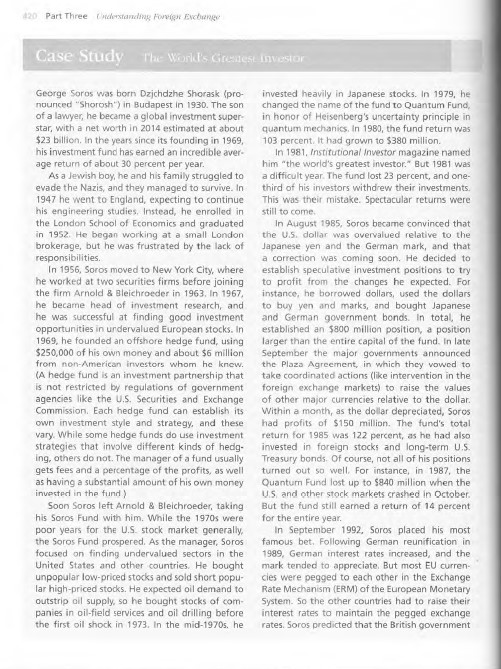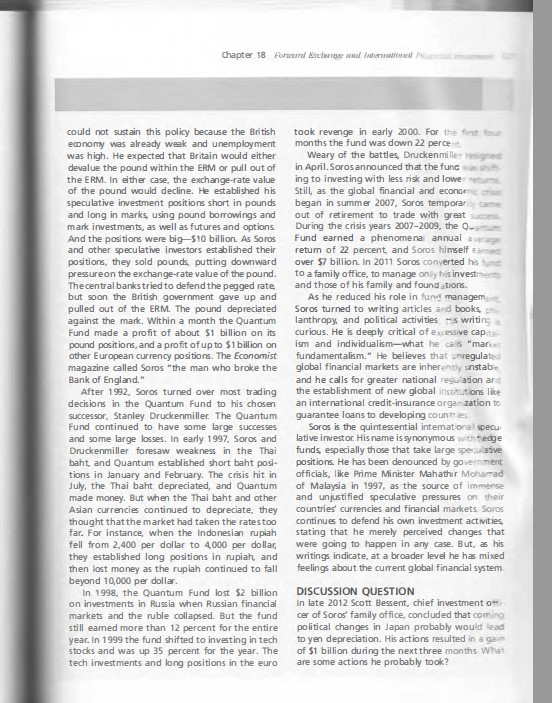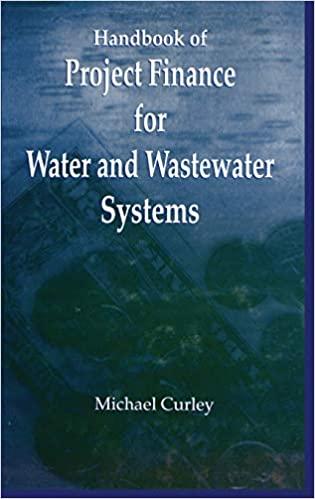In late 2012 Scott Bessent, chief investment officer of Soros' family office, concluded that coming political changes in Japan probably would lead to yen depreciation. His actions resulted in a gain of $1 billion during the next three months what are some actions he probably took?

20 Part Three weerstand in Exchange Case Study Me World's Gonest investor George Soros was born Dzjchdzhe Shorask (pro- nounced "Shorosh') in Budapest in 1930. The son of a lawyer, he became a global investment super- star, with a net worth in 2014 estimated at about $23 billion. In the years since its founding in 1969, his investment fund has earned an incredible aver- age return of about 30 percent per year. As a Jewish boy, he and his family struggled to evade the Nazis, and they managed to survive. In 1947 he went to England, expecting to continue his engineering studies. Instead, he enrolled in the London School of Economics and graduated in 1952. He began working at a small London brokerage, but he was frustrated by the lack of responsibilities. In 1956, Soros moved to New York City, where he worked at two securities firms before joining the firm Arnold & Bleichroeder in 1963. In 1967 he became head of investment research, and he was successful at finding good investment opportunities in undervalued European stocks. In 1969, he founded an offshore hedge fund, using $250,000 of his own money and about $6 million from non-American investors whom he knew. (A hedge fund is an investment partnership that is not restricted by regulations of government agencies like the U.S. Securities and Exchange Commission. Each hedge fund can establish its own investment style and strategy, and these vary. While some hedge funds do use investment strategies that involve different kinds of hedg. ing, others do not. The manager of a fund usually gets fees and a percentage of the profits, as well as having a substantial amount of his own money invested in the fund) Soon Soros left Arnold & Bleichroeder, taking his Soros Fund with him. While the 1970s were poor years for the U.S. stock market generally, the Soros Fund prospered. As the manager, Soros focused on finding undervalued sectors in the United States and other countries. He bought unpopular low-priced stocks and sold short popu- lar high-priced stocks. He expected oil demand to outstrip oil supply, so he bought stocks of com- panies in oil-field services and oil drilling before the first oil shock in 1973. In the mid-1970s, he invested heavily in Japanese stocks. In 1979, he changed the name of the fund to Quantum Fund, in honor of Heisenberg's uncertainty principle in quantum mechanics. In 1980, the fund return was 103 percent. It had grown to $380 million In 1981, Institutional Investor magazine named him the world's greatest investor." But 1981 was a difficult year. The fund lost 23 percent, and one- third of his investors withdrew their investments This was their mistake. Spectacular returns were still to come In August 1985, Soros became convinced that the U.S. dollar was overvalued relative to the Japanese yen and the German mark, and that a correction was coming soon. He decided to establish speculative investment positions to try to profit from the changes he expected. For instance, he borrowed dollars, used the dollars to buy yen and marks, and bought Japanese and German government bonds. In total, he established an $800 million position, a position larger than the entire capital of the fund. In late September the major governments announced the Plaza Agreement, in which they vowed to take coordinated actions (like intervention in the foreign exchange markets) to raise the values of other major currencies relative to the dollar Within a month, as the dollar depreciated, Soros had profits of $150 million. The fund's total return for 1985 was 122 percent, as he had also invested in foreign stocks and long-term U.S. Treasury bonds. Of course, not all of his positions turned out so well. For instance, in 1987, the Quantum Fund lost up to $840 million when the US and other stock markets crashed in October But the fund still earned a return of 14 percent for the entire year In September 1992, Soros placed his most famous bet. Following German reunification in 1989, German interest rates increased, and the mark tended to appreciate. But most EU curren- cles were pegged to each other in the Exchange Rate Mechanism (ERM) of the European Monetary System. So the other countries had to raise their interest rates to maintain the pegged exchange rates. Soros predicted that the British government Chapter 18 Feb Ini could not sustain this policy because the British emnomy was already weak and unemployment was high. He expected that Britain would either devalue the pound within the ERM or pull out of the ERM. In either case, the exchange rate value of the pound would decline. He established his speculative investment positions short in pounds and long in marks, using pound borrowings and mark investments, as well as futures and options. And the positions were big-510 billion. As Soros and other speculative investors established their positions, they sold pounds, putting downward pressure on the exchange-rate value of the pound. Thecentral banks tried to defend the pegged rate but soon the British government gave up and pulled out of the ERM. The pound depreciated against the mark. Within a month the Quantum Fund made a profit of about 51 billion on its pound positions, and a profit of up to $1 billion on other European currency positions. The Economist magazine called Soros "the man who broke the Bank of England." After 1992. Soros turned over most trading decisions in the Quantum Fund to his chosen successor, Stanley Druckenmiller. The Quantum Fund continued to have some large successes and some large losses. In early 1997, Soros and Druckenmiller foresaw weakness in the Thai baht and Quantum established short baht posi- tions in January and February. The crisis hit in July, the Thai baht depreciated, and Quantum made money. But when the Thai baht and other Asian currencies continued to depreciate, they thought that the market had taken the rates too far. For instance, when the Indonesian rupiah fell from 2,400 per dollar to 4,000 per dollar, they established long positions in rupiah, and then lost money as the rupiah continued to fall beyond 10,000 per dollar. In 1998, the Quantum Fund lost $2 billion on investments in Russia when Russian financial markets and the ruble collapsed. But the fund still eamed more than 12 percent for the entire year. In 1999 the fund shifted to investing in tech stocks and was up 35 percent for the year. The tech investments and long positions in the euro took revenge in early 2000. For the first to months the fund was down 22 percent Weary of the battles, Druckenmille et in April. Soros announced that the func ing to investing with less risk and lowe Still, as the global financial and econo began in summer 2007, Soros temporar out of retirement to trade with great During the crisis years 2007-2009, the Qua Fund earned a phenomena annual retum of 22 percent and Soros himself over $7 billion. In 2011 Soros converted his to a family office, to manage only his invester and those of his family and foundations. As he reduced his role in fund managem Soros turned to writing articles and books, lanthropy, and political activities is writing curious. He is deeply critical of excessive capa ism and individualism-what he cals "man fundamentalism." He believes that unregulate global financial markets are inherently unstabe and he calls for greater national regulation ar the establishment of new global institutions like an international credit-insurance organ zation to guarantee loans to developing countries Soros is the quintessential international specu. lative investor His name is synonymous with edge funds, especially those that take large spelative positions. He has been denounced by government officials, like Prime Minister Mahathir Mohamad of Malaysia in 1997, as the source of immense and unjustified speculative pressures on their countries' currencies and financial markets. Soros continue to defend his own investment activities, stating that he merely perceived changes that were going to happen in any case. But, as his writings indicate, at a broader level he has mixed feelings about the current global financial system DISCUSSION QUESTION in late 2012 Scott Bessent, chief investment of cer of Soros family office, concluded that coming political changes in Japan probably would lead to yen depreciation. His actions resulted in a gan of $1 billion during the next three months what are some actions he probably took








